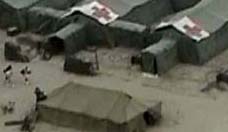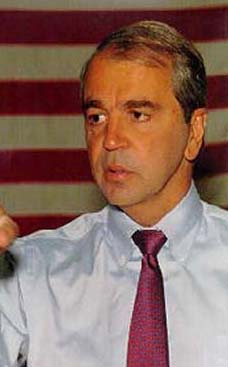
"I was over there and a guy came up. I was kidding around with a friend of mine over there in Swazi. And I said, you know, of course, I'm CIA, laughing. He says, never joke about that. That's not funny. And here's a guy that thought the pope was in London. He didn‘t know much about the Western world. But he knew the CIA was bad. And isn‘t it the same problem?"
Television Journalist Chris Matthews served as a Peace Corps Volunteer in Swaziland in the 1960's.
Chris Matthews (RPCV Swaziland) discusses alternatives to military service on "Hardball"
Peace Corps alternative to military service
How will this change affect the organization's standing worldwide?
MSNBC
Updated: 8:30 p.m. ET Aug. 8, 2005
Chris Matthews
Host of 'Hardball'
Since it’s founding in 1961, the U.S. Peace Corps has operated without any ties to the military or intelligence agencies, like the CIA. But, service in the Peace Corps is now an option for military recruits. They can apply to serve the non-active duty part of their military obligation in the Peace Corps, if they get accepted. This wasn’t the original intent of the Peace Corp and some are concerned by the alternative.
Former Peace Corps volunteer Mark Schneider and former Defense Department official Frank Gaffney weigh in with Hardball host Chris Matthews.
CHRIS MATTHEWS, ‘HARDBALL’ HOST: Mark, what is wrong with letting service people, men and women who have signed up for, say, eight years in the Reserves, to spend the last couple years, if they get in, in the Peace Corps?
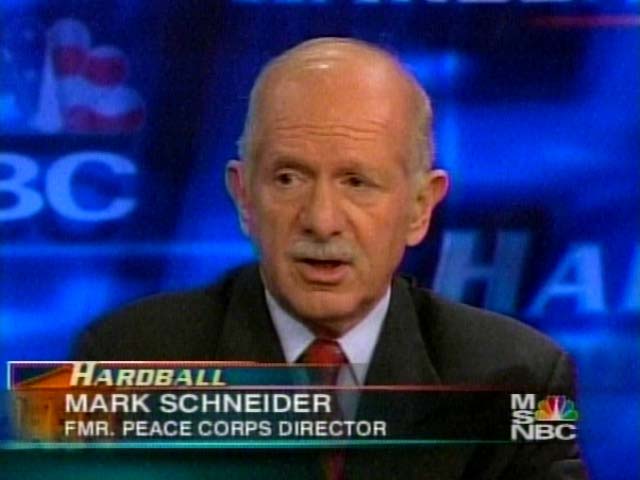
MARK SCHNEIDER, FORMER PEACE CORPS DIRECTOR: The main problem is that it undermines the independence of the Peace Corps. Ever since the Peace Corps began, not only President Kennedy from the outset, but every secretary of state since and every president since, Republican and Democratic, have issued executive orders and sent cables to the field, saying the Peace Corps shall be independent of day-to-day foreign and security policy. This blurs the line in a way that not only endangers the legacy of the Peace Corps, which has been very successful, but, unfortunately, also, to some degree, endangers volunteers.
You want to keep these institutions separate.
MATTHEWS: You rang a bell there, having been a volunteer back in the ‘60s. How does it endanger volunteers to have some former service people involved?
SCHNEIDER: Unfortunately, right now, there's a sense that there's a growing anti-Americanism in relation to Iraq, other reasons.
If it is known that Peace Corps volunteers, in a sense, are part of the military, in the sense that they're serving out their military obligation, that could in fact endanger volunteers. That's one of the reason why we‘ve always kept it separate and why the secretary of state has issued orders that you should not in fact try and use the Peace Corps for normal foreign policy reasons.
MATTHEWS: Frank Gaffney, you think it is OK to have military people use part of their service, if they get into the Peace Corps, to use it in the Peace Corps?
FRANK GAFFNEY, FOUNDER & PRESIDENT OF CENTER FOR SECURITY POLICY: I approach it from a different perspective. And I will put that up front.
We're in a war. The war we're in is going to require us for the foreseeable future to have capable people that are properly trained and properly equipped. Of those three, probably the most important I think is the people. Inducements to service in an all-volunteer force in time of war are going to become increasingly creative.
And this was one that was introduced three years ago, I think, by Senator John McCain and Senator Evan Bayh as a device for trying to make military service more attractive to some people who would like to participate in the Peace Corps.
That is, I think, an important idea and an important initiative.
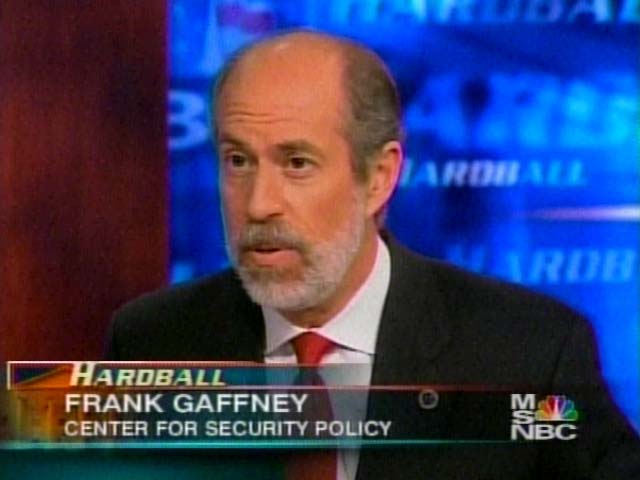
FRANK GAFFNEY, FOUNDER & PRESIDENT OF CENTER FOR SECURITY POLICY: Obviously, in this war, you also want to be able to bring other tools to bear. And those tools can include diplomacy. They can include economic or financial tools. They can include intelligence. The Peace Corps has a role to play in that. It, too, wants the best people it can get. I'm reasonably sure some of those are going to be excellent military veterans. And I hope, and believe, that that can be accomplished without undue cost to either the corps or its personnel.
SCHNEIDER: There is a way to do it, which is to say that the military service is military service. You finish your military service and then you apply like every other American for entering the Peace Corps.
That's the way it should be.
MATTHEWS: Why don‘t you just say to a guy — you want to be induced people to join the military? You don't have to go in for the full eight years. Go in for six. That's an inducement. After you‘ve done your six, join the Peace Corps.
Why do you have to include it as part of the package?
GAFFNEY: I think the idea was to get people to come in for the full stint.
MATTHEWS: Is the Peace Corps having problems recruiting people?
GAFFNEY: I'm talking about the military having problems recruiting people.
MATTHEWS: But why would a person in the military want to be. Wouldn‘t it be better inducement to say, you have only got six years to serve, if you want to do six?
GAFFNEY: Conceivably. I think the way….
MATTHEWS: That's a better deal than you got to do eight and spend two in Africa.
GAFFNEY: The way it's been structured is to give them that as part of an overall package of eight.
MATTHEWS: I want to ask you the question. You're a reasonable person.
If a person is sitting over there in Africa and they're a person who is, say, in Swaziland, where I served back in the ‘60s, and a guy comes up — I‘ll tell you what happened to me.
I was over there and a guy came up. I was kidding around with a friend of mine over there in Swazi. And I said, you know, of course, I'm CIA, laughing. He says, never joke about that. That's not funny. And here's a guy that thought the pope was in London. He didn‘t know much about the Western world. But he knew the CIA was bad.
And isn‘t it the same problem?
SCHNEIDER: It is the same problem.
MATTHEWS: I just know, from personal experience, that if there's any doubt about why you are or who you are —because all you are is some guy from America and that you look different, in many cases. You talk different. And they go, now, who is this guy that's come to teach me, in my case, business? And what is he really up to? Is this a cover? Did he kill anybody in Iraq?
I mean, there's like a case. Do you want guys who have actually been in combat to be in some other country and let them all know you were in combat in Iraq? Do you think that's work?
GAFFNEY: I certainly want to preclude people who are people who are otherwise qualified.
MATTHEWS: I don‘t know.
GAFFNEY: No, you asked me a question. I wouldn't preclude veterans who have served their country in difficult places from serving their country in other ways, if they're qualified.
MATTHEWS: If they‘re out of the military?
GAFFNEY: Well, I think that's a question that ought to be addressed.
MATTHEWS: But you told me before you came on that you can still be called back.
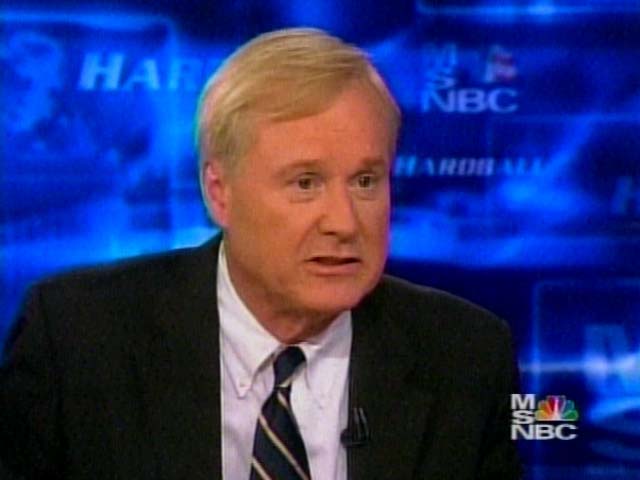
MATTHEWS: So, you‘re over serving in Kenya somewhere. You could be a guy who is working with you over there, a local ministry person from the ministry you‘re working for, knows the whole time you‘re over there that you can get yanked back into the military. So, he always sees you as a...
GAFFNEY: Under very extreme circumstances.
MATTHEWS: But he always sees you as a military type, doesn‘t he?
GAFFNEY: I don't know. The question of whether that is a problem ought to be addressed.
MATTHEWS: Mark, is that a problem?
SCHNEIDER: That‘s a problem.
It is not only a problem for that individual. The problem is for all the other volunteers that are going to be thought of as potentially still in the military who have nothing to do with the military. And what you're doing there is, you‘re endangering the Peace Corps, which is, long term, in the interests of the United States, is providing people around the world with the knowledge about who we are as a people.
It is in a sense doing what you talk about, in terms of fighting the war on terrorism by letting other countries know who we are. You're endangering that for a very few number of people who might...
MATTHEWS: Here's one I would want. If I were a military guy, I would not take this option.
Suppose you‘re over there fighting, risking your life for your country for a couple years in Iraq and you‘re involved in combat. You're really in it. And you‘re killing people. You're being shot at. It is horrible. The word gets out that you're now serving in Timbuktu somewhere all by your lonesome out in the middle of some bush somewhere, with nobody around you, no guns, nothing, no protection.
And they know you're over there. It's not hard for them to figure out where our guys are. Do you think you would like to be stuck out there all by yourself without a gun, stuck in the middle of Africa?
That any time an al Qaida guy wanted to go pick you off, they could do it with impunity? Wouldn‘t that be a problem for you?
GAFFNEY: It might be a problem for me. It might be a problem for everybody else, in which case this is a moot point.
MATTHEWS: Yes.
GAFFNEY: But the question is, if it‘s not, if some guys would like to opt for this, they still have to go through all of the rigmarole that gets you into the Peace Corps. But if they want to do that, Chris, it seems to me, they shouldn‘t be denied the opportunity to do it.
MATTHEWS: OK. Let me ask you a question.
GAFFNEY: And your question as to whether or not there ought to be an amendment to the law that gets them out of the military reasonable question to debate.
MATTHEWS: I think it would be great. First of all, I think military guys, with their training, should join the Peace Corps when they‘re done. I think it would be great. That‘s a totally different story.
GAFFNEY: Well, but they got the same problem that you just posed. They could conceivably have the same problem. What I would still ask is, we are going to have to come to grips as a nation with the problem of meeting the needs of the military in a wartime environment.
SCHNEIDER: Sure, but don‘t destroy the Peace Corps to do it.
GAFFNEY: I‘m not suggesting that you do. I'm not sure this would.
But we do need to have that debate, too. And this may not be the fulcrum on which it turns, but I think it is part of the larger debate we have to have.
MATTHEWS: You could promise them they could go to Harvard for the last two years. You can make all kinds of promises.
GAFFNEY: That could be even more dangerous than Tanzania. Who knows?
SCHNEIDER: No, the problem is not only with these individuals. The problem is the rest of the volunteers serving, who are going to be put into this same basket or could be by somebody who wanted in fact to take advantage of the argument that they‘re in the military.
MATTHEWS: Last question. Do you think the existing Peace Corps rules that says you can never have served in an American intelligence agency before serving in the Peace Corps is a good rule?
GAFFNEY: I don‘t know whether it is in fact implemented.
SCHNEIDER: It is.
GAFFNEY: I would assume that the same basic principle applies as the one that's just been laid out here.
MATTHEWS: But do you think it is problem? Do you think is OK for intelligence spooks to go work in the Peace Corps?
GAFFNEY: Personally, we need human intelligence everywhere. And I wouldn‘t use anybody's cover inappropriately, but there may be certain cases where it is...
MATTHEWS: If anybody gets idea that Peace Corps guys are CIA, they‘re dead.
SCHNEIDER: Let's be clear that there has been executive orders issued by every president not to have not to use the Peace Corps in any way. And it has not been done.
MATTHEWS: You‘ve never heard, I‘ve never heard of a Peace Corps volunteer ever involved with the CIA.
MATTHEWS: Have you?
GAFFNEY: I‘m not suggesting that they are.
MATTHEWS: Have you ever heard of any connection?
SCHNEIDER: Not that I know of.
MATTHEWS: OK.
GAFFNEY: You asked a hypothetical question.
MATTHEWS: I think we should always be able to answer it negatively.
SCHNEIDER: Exactly. And every president has in fact established a rule that they may not. And it has never been violated.
Watch 'Hardball' each night at 7 p.m. ET on MSNBC.
© 2005 MSNBC Interactive






